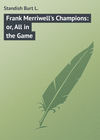Czytaj książkę: «Frank Merriwell's Return to Yale»
CHAPTER I
GREETINGS ON THE CAMPUS
"Ah, there, Merriwell!"
Frank Merriwell was crossing the campus at good old Yale, and this cry, in a familiar voice, sounded from Durfee Hall.
He turned his eyes toward the favorite dormitory, and seated at an open window on the ground floor he saw his classmate, Jones, he of the famous nickname, "Dismal."
"Hello, Dismal," called Frank, "aren't you going to come out and shake hands with a fellow?"
"I would if it wasn't for the shower," responded Jones, whose usually solemn face was graver than ever.
"Shower?" repeated Frank, looking up in surprise at the perfectly clear sky.
"I see that you've just arrived, so that you probably haven't noticed it," said Dismal, coming out of his window to avoid going around through the hall.
He came slowly across the grass plot that lay between him and Frank and held out his hand, saying:
"How are you, Frank? I'm glad to see you."
Frank, who had just come from the railway station, had a gripsack in each hand. He set them down upon the grass and shook Dismal's hand warmly.
"There it goes!" exclaimed Dismal, with something like animation, "the shower's begun again."
Frank's brows wrinkled in perplexity.
"I don't see any signs of a shower," he said.
"That's because you haven't been here all the morning," returned Jones, solemnly. "I've been sitting there in my window for fully three hours watching it; it's been a perfect rain of gripsacks on the campus. Every fellow that comes along stops to shake hands with everybody he meets, and every time he stops, down goes his gripsacks."
Frank laughed.
"You're the same old cheerful joker, Dismal," he said. "But you're beginning early. If you keep up this sort of thing you'll actually get caught laughing before the end of the junior year."
There was a faint shadow of a smile on Dismal's face as he responded:
"Well, anyhow, Frank, I'm glad to see all the fellows come trooping back. Are you glad to get here yourself?"
"Why, of course I am."
"Had a good time during the vacation?"
"I always have a good time," said Frank. "Don't you?"
"Oh, yes, in my way. To tell the truth, I spent most of the summer dreading the day when I should have to come back to the confounded old books, and lectures and examinations; but I got here yesterday, and now I'm dreading the time I shall have to go away again."
"Then I see that you're sure to enjoy yourself during the junior year," said Frank, stooping to pick up his gripsacks.
"When I've got my room in order I'll come around and go to luncheon with you."
"Do!" replied Dismal. "I'll go back to my window seat and watch the shower. Hello! there comes Browning, and he's loaded down with gripsacks, too. My, but there'll be a perfect torrent!"
Big Bruce Browning came up with friendly words of greeting, and as Dismal had predicted, he set down his gripsacks in order to get his hands free.
"It's getting worse and worse!" remarked Dismal, as if worried about it, "for here comes Rattleton and Diamond from one direction and Harold Page from another."
The last named students were on their way, just as Frank had been, to their respective rooms, and each carried more or less baggage, except Diamond, who, being something of an aristocrat, had sent all his traps to his room on a wagon.
Seeing Frank standing near Durfee, they all turned toward him, and in a moment there was a lively exchange of greetings and small talk.
Four of these students, Merriwell himself, Jack Diamond, Bruce Browning and Harry Rattleton, had not been long separated, to be sure, but after a sporting trip which they had undertaken across the continent, it was like meeting after a long absence to find themselves together again at Yale.
It was the beginning of a new college year, and members of all classes were trooping back to begin their work.
While these juniors were discussing all manner of things that interest students, such as the prospects of the football eleven, the make-up of next year's crew, and the coming elections into secret societies, members of other classes were scattered about the campus chatting in much the same way.
Among those who appeared upon the famous quadrangle were many who belonged to the incoming freshman class. It was easy to recognize them, for, as Rattleton observed:
"You can tell a freshman with the naked eye."
They were either proceeding in a fearful hurry, as if they thought they were in danger of getting in late to an examination, or they were standing in awkward idleness looking at the strange buildings and evidently not knowing which way to turn and dreading to ask anybody a question.
The juniors smiled indulgently as a group of three or four candidates for the freshman class passed them.
The newcomers were discussing an examination from which they had just come, telling each other how they had answered certain questions and wondering if they would get marked high enough to pass.
"I can sympathize with them," remarked Diamond. "I know just the kind of shivers they're suffering from."
"What jolly good subjects those fellows would be for a quiet hazing," remarked Page.
"You mustn't forget," said Frank, "that we're juniors now, and therefore out of it so far as hazing is concerned."
"That's right," added Browning, "the freshies are nothing to us; they're far beneath us."
"Except in one sense," said Frank. "The sophomores, you know, will get even for the hazing we gave them, by taking it out of the freshies, and so it becomes our duty, in a way, to take care of the freshmen and see that they get fair treatment."
Speaking of this it may be well to explain that in all colleges the juniors take this attitude toward the freshmen.
As a rule the freshman receives the attention of a junior with a great deal of gratitude, but also as a rule he does not find that it amounts to very much.
The junior is ever ready to give him a good deal of solid advice, and a great deal more ready to get the freshman to do errands for him, and all manner of odd jobs that the freshman is quite sure to do, until, as the boys say, he tumbles to the fact that after all the junior is really making game of him.
"Speaking of hazing, though," said Page, suddenly, "I've got a new room."
"Have you? Where is it?" asked Rattleton.
"It's up High Street a way, in one of the oldest houses in New Haven."
"Good room?" asked Browning.
"Capital! I've got to do some grinding this year and the room will suit me exactly for that, but there'll be hours when the books can be forgotten, and then you fellows'll find that the room is a corker for cards or any sort of jollification."
"I don't see what that's got to do with hazing," remarked Merriwell. "You said that the hazing reminded you of it."
"Yes, I'll tell you why, or rather I'll show you. There's something about that room that would be perfectly immense if we were sophomores now. Come down and see it, will you?"
"Better wait a week," said Browning, picking up his bags, "I'm busy now."
"How extraordinary!" remarked Dismal Jones. "If the faculty should hear that Browning was busy they'd give him a warning!"
Browning frowned in mock anger and Frank, putting on an expression quite as solemn as Dismal's own, and laying his hand on Dismal's shoulder, said:
"The fact is, boys, Jones has become ambitious. He knows that the election of class-day officers is only a little more than a year away, and he's getting himself into training for one of the positions."
"Oh, go on, it isn't so!" exclaimed Dismal.
"That's just his modesty," continued Frank, "for of course he doesn't want to push himself forward, but he's quietly waiting for his friends to recognize his great ability, and as we're his friends we just want to boom him from now on, and I take this occasion of nominating Dismal Jones, Esquire, as class wit."
Rattleton burst into guffaws of laughter, while the others smiled.
"The idea is humorous enough to elect him!" said Diamond.
"Well, if he's going to be a candidate," added Browning, "we must put the campaign through in proper fashion. We must organize a Dismal Jones Club and have an emblem.
"I move that we all wear crape upon our left arm and mourning bands upon our hats until the election."
"Great Scott!" howled Rattleton, "the time for mourning will be after Jones is elected."
Jones listened to this joking with stolid good humor; never a smile lingered on his face, but his solemn eyes showed no resentment.
"It's all right," he remarked when they gave him a chance to speak, "you fellows think you've got me on a long string, but I'd like to bet that if I should run for a class office, I wouldn't be last in the race!
"Of course," he added, hastily, "I haven't really any insane notion of doing such a thing."
The students laughed again, picked up their gripsacks and prepared to separate.
"Say!" called Page, eagerly, "what about coming down to see my room?"
"Oh, we've got a whole year ahead of us," growled Browning.
"I'll run down in the course of an hour or two," said Frank. "I don't think there's anything to do at my room, and I'll be glad to learn the way to yours. What's the number?"
Page told him, and Frank exclaimed:
"Why! some of the professors live there, don't they?"
"Pretty much the whole house," responded Page, "is let out to students and instructors; I believe Prof. Babbitt has his room there – "
"Babbitt!" interrupted Rattleton; "he's the most unpardonable crank in the whole faculty."
"Well, I shall let him alone, and I've no doubt that he will let me alone," returned Page. "He's a good deal of a hermit, I'm told, and I don't think that his being in the same house will make a particle of difference to me. Anyhow, there's the room and I want you fellows to see it."
"I'll be down in a little while," said Frank, and the others also promised to come in the course of a day or two.
CHAPTER II
IMPRISONED IN A CHIMNEY
Frank found that there was nothing whatever in his room to demand his attention, and so, after he had unpacked his grips and put away their contents, he went down High Street to call on Page.
The house in which Page had taken a room was made of stone. Its walls were very thick, the ceilings low, and everything about it made it seem like a relic of the last century.
This is indeed what it was. In former days it had been the residence of one of the wealthiest men in New Haven, but that was long ago; for years it had been used wholly as a lodging house.
Page's room was on the second floor. It was very large and cheerful. Three windows looked out on the street and in each of them was a broad seat provided with heavy cushions.
On the opposite side of the room there were two old-fashioned benches built against the wall. Between the ends of these benches and right in the middle of that side of the room was one of the ancient chimneys of the house.
It came out three or four feet into the room and gave the place an antique and interesting appearance. Page had hung a lot of ornaments in the way of fencing foils, boxing gloves, baseball bats, and other materials used by students, upon this chimney.
After Frank had taken a general look around the room he said:
"It's a nice old den, Page, and I think the chimney there is the best part of it. What a pity that there isn't a fireplace. There ought to be, and it strikes me that there was at one time."
Saying this, he knelt down before the chimney and examined the stones of which it was made. These had been painted white. Frank thought he could see a line that indicated what had once been an opening. Page watched him in silence.
"There certainly was a fireplace here at one time," said Frank, rising, "and if I were in your place I'd have the stones cut away so that you can use it again. An open wood fire there would look immense in winter."
"That's a good scheme, Frank," responded Page, "and it was that chimney that led me to speak of the room. I didn't know it when I hired the place, but since I've got in I've discovered that – well, I'll show you."
With this he stooped over by the chimney, put his hand upon what appeared to be a little projection from one of the stones, turned it, and opened a door.
Within the door there was revealed an old-fashioned fireplace, deep and high. All it needed was andirons and poker to make it complete.
"Well, that's funny!" exclaimed Frank.
"Isn't it?" returned Page. "I got on to the thing wholly by accident. When I was hanging up some of the things there I stumbled and caught hold of that little projection for support.
"The thing turned in my hand, and the first thing I knew the door was open. It opened a little hard, showing that the thing hadn't been used for a long time."
"Didn't the owner of the house speak of it?"
"I don't think he knows anything about it."
"Have you told him?"
"Not much!"
"Why not?"
"Well, because it just struck me that such a place as this was a kind of a secret worth keeping. You can see for yourself that it was the evident intention of the person who set up this door that it should be a secret. The hinges are perfectly concealed, and it has been fitted in and the edges painted in such a way that only the closest inspection would give a fellow a suspicion that there was any opening there."
At this moment there was a knock, and Browning came in.
"I thought you were coming next week?" exclaimed Page.
"Well, I found I'd nothing better to do than run down here. What's that you're looking at?"
The boys explained the matter to him, and in his slow way he admitted that if they were sophomores it would be quite possible to utilize this secret door in the course of hazing freshmen.
"As we're not in the hazing business now," he said, "I can't see any use for the place, Page, except for you to hide in when your creditors call."
"Huh!" retorted Page, "it's my habit to keep my bills paid."
"It'll make you unpopular if the fellows know that."
"I was telling Page," said Merriwell, "that if I had the room I'd take down that door entirely, get some andirons and burn a log of wood on a winter evening."
"That's a good scheme," returned Browning, "but if I should do anything of that kind I should never get a stroke of work done here; this room was never meant to study in, but it's an ideal loafing place."
With this he threw himself upon one of the window seats and looked out. The others took places on the other windows and for a few minutes their conversation turned upon college topics.
Then Browning, who was a little restless, as most students are immediately after a vacation, said he would have to be going. Page urged him to wait, but he shook his head.
"By the way," he said, with his hand upon the door, "I've got some news."
"Well?" said both the others together.
"I regret to say it isn't pleasant news, but it may be important to you two; it certainly is to me."
"Spring it!" exclaimed Page.
"Cut the preface!" said Merriwell.
"Babbitt has announced an examination for juniors in mathematics."
"What!"
Merriwell and Page were so surprised that they sat down suddenly. Browning remained standing by the door.
"It's a fact," he said.
"But what can that mean?" asked Merriwell. "We had our regular examination last spring."
"I know we did, but Babbitt's going to have another just the same."
"Where did you learn it?"
"On the bulletin board, of course. The notice was put up not more than an hour ago."
"When is it to be?"
"Three days from now."
Page looked blankly at Merriwell.
"I never was any good at mathematics," he said, "and after a summer without a thought of it I don't believe I could do an ordinary sum in multiplication."
"Well," responded Frank, doubtfully, "it can't be that the examination will have any serious consequences for us fellows if we passed last spring."
"There's no telling how serious Babbitt may make it," said Browning. "The notice on the bulletin board, of course, doesn't give any explanation, but I met Frost, the fellow who graduated a couple of years ago, you know, with high honors in mathematics, and who was made instructor in one of the lower departments of that course.
"I knew Frost quite well when he was a student, so I asked him if he knew anything about this."
"What did he say?"
"He smiled a little queerly and answered that Professor Babbitt had his own ideas."
"In other words, Frost wouldn't tell?"
"Oh, no, that's not it; Frost is a member of the faculty now, you see, and of course he has to speak very respectfully of the older men.
"I got a very distinct idea that Frost regarded Babbitt's examination as all nonsense, but he did explain to me what Babbitt's idea about it is."
"That's what we want to know."
"It's just this way," said Browning, sitting down. "It seems our class is enlarged by the addition of quite a number of men who have graduated from or studied at other colleges.
"They have applied for admission into the junior class, and there's got to be an examination for them, of course; in fact, the examination for such candidates is going on now."
"That's quite a usual thing," remarked Merriwell.
"Yes, certainly, but Babbitt has declared that the examination of last spring was very unsatisfactory. He says men can't go ahead in mathematics unless what they have done before is thoroughly learned, and he proposes to find out just what sort of talent there is in our class before he begins a year's work."
"He'll find out what I can't do!" groaned Page.
"Probably he knows that already," said Merriwell.
"That's the substance of it, anyway," added Browning. "Babbitt's idea is to strike an average as to what the class can do and proceed from that."
"Then I shouldn't think," said Merriwell, "that the examination should have any terrors for us."
"You'd think," exclaimed Page, "that Merriwell looked at an examination as he would a plunge in the surf, just a little dip for the fun of it, and it's all over. It won't be so with me."
"Don't worry," responded Frank, "you've got three days in which to cram."
"And that's just what I'll do, I'm thinking."
Page dropped his chin upon his hands and looked gloomily at the floor.
"I'm sorry to give you unpleasant news," said Browning, rising, "but I told you I thought it was important. So long."
With this he went out.
"Oh, well," said Page, after a moment, "I'm not going to be knocked out by that! I'll just go into the examination and do as well as I can and take chances; that's what the rest of us have got to do."
"That's the best way to look at it," Frank answered, "and I don't think I shall bother my head with cramming for it.
"If I were you, Page, I'd go down to some of those second-hand stores on the street and see if you can't pick up a pair of old-fashioned andirons. You don't want to get new ones, you know, for a place like this, they wouldn't seem appropriate."
"That's so," Page answered, with a queer smile, "I believe I'll adopt your suggestion at once. How would you place them?"
"Why, just as they are placed in every other fireplace," Frank answered, "one on each side; that is, if the old chimney will draw."
"Perhaps it won't," said Page.
"I hadn't thought of that," continued Frank. "It may be that the place was closed up because the chimney was defective. Let's see if we can find out."
So saying, he knelt and entered the fireplace. Once inside it was easy to stand upright, for the chimney was broad, and as he looked up he could see that it ran with a slight incline clear to the roof.
"There's nothing to prevent a fire from being built here," he said, with his eyes turned upward. "Such a chimney as this would draw like a furnace."
Page made no response.
"I declare," Merriwell added, "it makes me wish that winter had come so that I could see a roaring old blaze of logs here. Doesn't that strike you about right?"
As Page made no response, he turned to look at his classmate, and then discovered that the secret door to the fireplace had been closed.
With his eyes turned upward and seeing the little patch of light at the top of the chimney he had not noticed that the light from the room had been shut off.
"Hello, there!" he called, feeling along the wall to find the door. "I'm no freshman."
There was no sound from Page's room. Frank found a match in his pocket and struck it. From inside it was easy enough to distinguish the outlines of the secret door that concealed the fireplace.
It was not possible, however, to discover any way by which it might be opened. The latch was the kind used on doors, but strong, and with no knob on the inside.
Frank pushed against the door with some force. It did not yield in the least degree.
"Seems to me," he thought, "that Page has a queer idea of fun to lock me in like this. I've a good mind to kick the door down."
He thought a moment before deciding to do this, and reflected that it would hardly be a good-natured way of treating the joke.
If Page meant to have some fun with him by making him a prisoner, the joke would be all the more successful if Merriwell should get mad about it and break open the secret door.
"I think," thought Frank, "that I'll get even with Page for this in a way that will surprise him."
His match went out just then and he began to feel in the darkness of the stones that made the chimney. They were untrimmed stones, so that the interior surface was very irregular.
Just above his hand, but within reach, was an iron bar crossing the chimney; it was put there to bind the walls.
Frank drew himself upon this and then, being in the narrow part of the chimney, was able to work his way upward by clinging with hands and feet to the rough edges of the stones.
It was slow progress, but not difficult, and sure. The only question would be whether the opening at the top of the chimney would be large enough to permit of his crawling through.
He had got about halfway up when he halted in his journey. He had heard voices, and he recognized both of them.
He knew that he was on the level of the room above Page's, and he realized that the sounds of talking came to him distinctly because there was a fireplace there that connected with this same chimney.
The voices he heard were those of Prof. Babbitt and Instructor Frost.
"The fact is, Frost," Babbitt was saying, "I'm aiming this examination at certain men in the class, and I've no hesitation in saying so. There's that fellow, Merriwell, for example; I'd like to force him to do more studying."



















